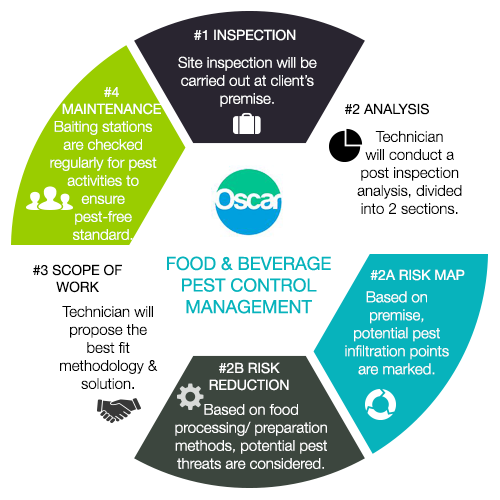The Role Of Pest Control In Food Safety And Security And Hygiene
The Role Of Pest Control In Food Safety And Security And Hygiene
Blog Article
Short Article By-Duggan Glover
Are you aware of the surprise threats that pests pose to the safety and security and health of your food? From rats to pests, these unwanted visitors can infect your active ingredients, surfaces, and storage locations.
This post explores the critical function of insect control in keeping the highest standards of food safety and hygiene. Discover reliable techniques and prevention measures that will certainly aid you protect your organization, consumers, and track record.
Do not allow parasites compromise the quality of your food.
The Impact of Pests on Food Security and Health
In your kitchen, insects can have a considerable impact on food safety and security and health. These unwanted guests, such as rats, pests, and cockroaches, can pollute your food, surface areas, and utensils with hazardous microorganisms, infections, and bloodsuckers. They can quickly access your cupboard, closets, and also your refrigerator, leaving droppings, pee, and hair.
Not only can they spoil your food by eating via packaging, yet they can also spread illness like Salmonella, E.coli, and Listeria. Think of preparing a dish for your household, not aware that the components you're making use of are already infected.
It's crucial to take prompt activity to stop and manage insects in your cooking area. Routine cleansing, correct food storage, and specialist parasite control procedures are important to guarantee food safety and security and preserve a hygienic atmosphere in your kitchen.
Efficient Pest Control Techniques for the Food Industry
Carrying out reliable parasite control approaches is crucial for keeping food safety and security and health in the food sector. By applying these techniques, you can avoid insects from infecting the food and make sure that your products are safe for usage.
One efficient technique is to frequently inspect and monitor your facility for signs of parasite activity. This consists of monitoring for droppings, nests, or any damages caused by pests.
It's additionally crucial to seal all entrance points to prevent pests from entering the facility. Normal cleaning and sanitation are crucial, as insects are attracted to food residue and spills.
In addition, proper waste management is vital to stop the accumulation of food waste that can draw in bugs.
Keeping Hygiene Specifications Via Parasite Avoidance Actions
To maintain hygiene criteria, you should consistently execute bug avoidance actions. By taking aggressive actions to prevent bugs from entering your food facility, you can make certain the security and tidiness of your premises. Right here are some efficient insect avoidance steps to consider:
- Seal all splits and crevices: Parasites can enter with even the smallest openings. Regularly check and secure any kind of spaces in doors, windows, wall surfaces, and floorings to keep pests out.
- Proper waste management: Get rid of food waste promptly and firmly in sealed containers. This will certainly minimize the attraction of parasites and avoid problems.
- Routine cleansing and sterilizing: Maintaining sanitation in your establishment is vital. Routinely clean and sterilize all locations, paying unique interest to locations where parasites might conceal or reproduce.
- Implement a surveillance system: Frequently inspect your premises for indicators of bug task. Mount bug tracking devices, such as traps or sensors, to recognize and address any type of possible problems early.
Keep Reading remember, when it comes to food safety and hygiene, parasite control plays an essential function.
By carrying out Rat control near me and safety nets, we can make sure the greatest standards of sanitation and security in the food sector.
Do not let pests jeopardize the top quality of our food; allow's stand together and safeguard our health and health.
